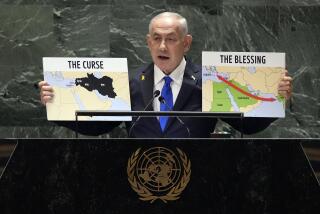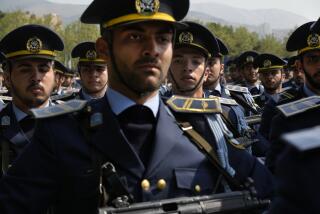Opposition to U.S., Israel unites conference attendees
BEIRUT â Black clerical turbans bobbed up from the sea of long, curly hair and fashionable berets. Venezuelan leftists sought an interpreter to speak with Egyptian nationalists. Iranians handed out DVDs celebrating the assassin of Egyptian President Anwar Sadat and baseball caps that carried a quote from Ayatollah Ruhollah Khomeini: âIsrael must be wiped out.â
Many snoozed during former U.S. Atty. Gen. Ramsey Clarkâs speech about American foreign policy in the 1950s. But all perked up when the Shiite militia Hezbollahâs No. 2, Naim Qassem, delivered a fiery keynote speech slamming the United States and Israelâs war against Hamas in the Gaza Strip.
âImam Khomeini called America the Great Satan. Others call it imperialism or globalization,â he said to the hundreds who gathered here this weekend for a long-scheduled conference of Islamic, Arab, Western and Latin American opponents to the U.S. and Israel. âNo matter what words you use to describe it, itâs the same enemy.â
While Israel and some quarters in Washington depict the slowing conflict in Gaza as a battle to suppress Iranian power and influence in the Levant, Tehran and its allies also have escalated the warâs geopolitical significance. They have assembled an international coalition of Islamists, leftists and Arab nationalists to place the Gaza conflict as part of a broader fight against the United Statesâ policies.
The Beirut International Forum for Resistance, Anti-Imperialism, Peopleâs Solidarity and Alternatives, organized by Hezbollahâs Center for Consultative Studies and Documentation think tank, showed how much the self-described âcamp of resistanceâ had invested in the Gaza conflict. The gathering also underscored how widely Iran and Hezbollah have sought to broaden ties among organizations and governments that, regardless of their ideological differences, are united in opposing Israel and its primary patron.
The conference was a rare chance to gauge the sentiments, strategies and scope of an emerging front of governments such as Iran, Syria and Venezuela; militant groups, including Hamas and Hezbollah; and like-minded organizations from around the world that define themselves in part by their opposition to the United States.
The motley assortment at Beirutâs UNESCO Palace exhibition hall included Nasserites from Egypt; Sunnis and Shiites from all over the Middle East; Marxists and various activists from India, the Philippines and Western Europe; and a delegation of lawmakers dispatched by Venezuelan President Hugo Chavez. He and Bolivian President Evo Morales became heroes in the Arab world after they expelled Israeli envoys to their countries to protest the Gaza offensive.
Some are skeptical of any lasting alliances between committed Islamists and leftists who tend to oppose organized religion.
âYou can be against America together but nothing more than this,â said Patrick Haenni, a researcher at Religioscope, a Swiss think tank that studies religion. âYou cannot build something together.â
Though the conference was planned well before Israel launched its offensive in Gaza on Dec. 27, the death and destruction winding down 300 or so miles south took center stage.
âAll the people of the world -- including the people here from 70 countries -- they are all helping the people of Palestine so that they will be free,â Ali Akbar Mohtashamipour, an Iranian cleric who is believed to be have been a founder of Hezbollah, said on the sidelines of the conference.
âThere are two fronts here,â the cleric said in a brief interview with a Western reporter. âOne front that is humane, that has stood against the West and Israel and includes all the peoples of the world who are in support of Palestinian freedom and the Palestinian nation, and another that is inhumane, against human rights and in support of war criminals.â
The crowd roared with applause as each speaker denounced the U.S. and Israel. Interpreters translated speeches into English, French, Spanish and Arabic.
The three-day conference, which began Friday evening, presented a hodgepodge of ideas. Some participants mixed the rhetoric of class warfare with that of the Palestinian cause. âResisting occupation cannot take place unless we fight against economic oppression,â said Laila Ghanem, a Lebanese journalist and activist.
Gaza, said Belgian social scientist and activist Francois Houtart, âis part of an imperial project for control of the world.â
Some, including the firebrand Qassem, praised those who send weapons to Hamas. But mostly the ideas voiced at the conference were peaceable.
Some called for more pressure on Arab governments to cut ties with Israel. Mauritania, one of only three Arab states with normal relations with Israel, announced Friday that it would expel the Jewish stateâs envoy, while Qatar said it would suspend low-level diplomatic ties. Others urged boycotts of companies that do business with Israel and support for Palestinians lobbying European governments to shift policies.
Qassem urged more rhetorical support for Hamas, mocking Israeli and U.S. contentions that Iran and Hezbollah were secretly behind the militant group.
âThey think we will be embarrassed if they say that,â he said to thunderous applause. âWell, we are with Hamas and Iran, and we add Chavez from Venezuela and Bolivia. Yes, we will be one front in the face of America and Israel, and our slogan will be, âLet imperialism fall.â â
--
Special correspondent Raed Rafei contributed to this report.
More to Read
Sign up for Essential California
The most important California stories and recommendations in your inbox every morning.
You may occasionally receive promotional content from the Los Angeles Times.










